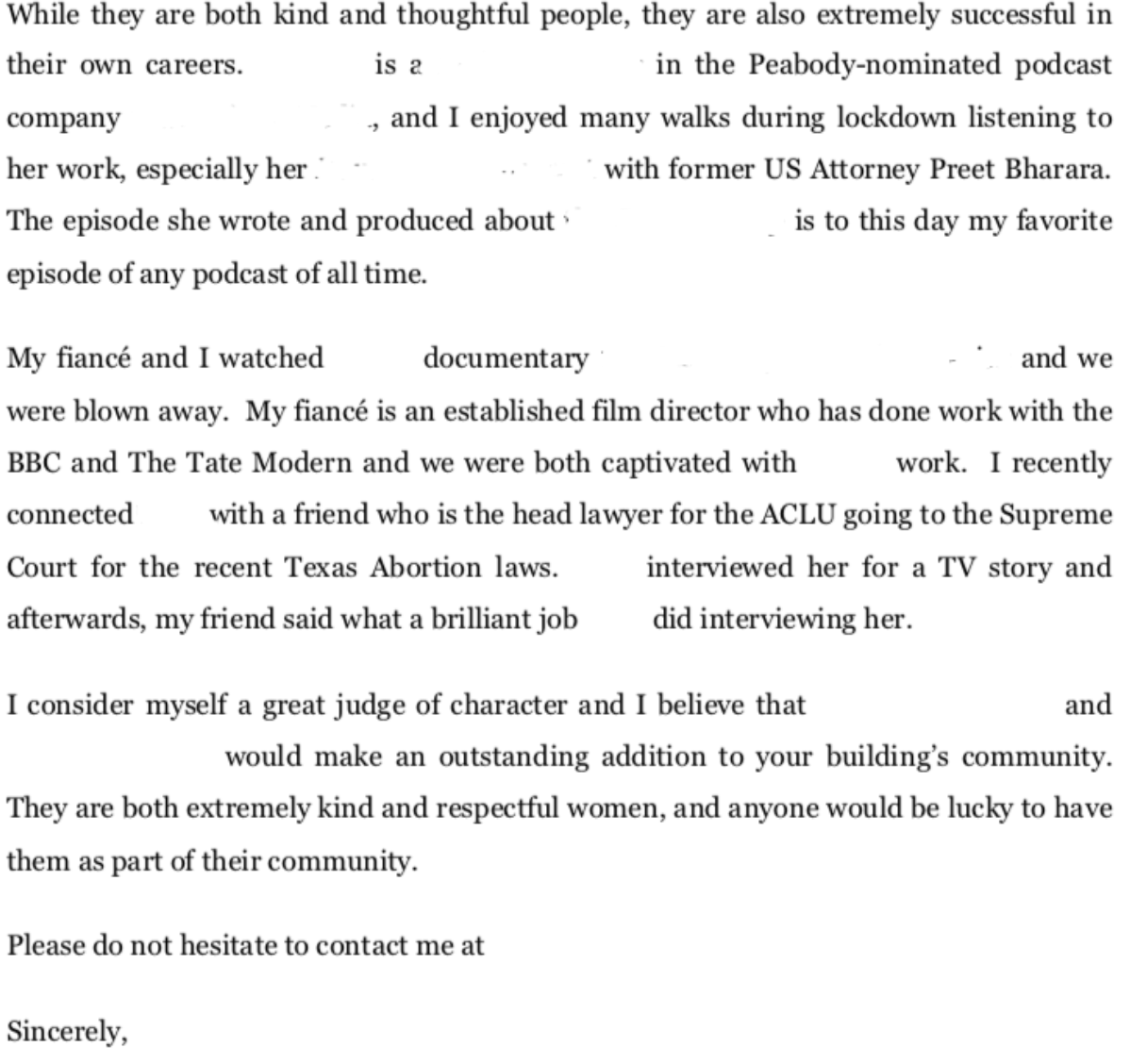Here are 8 real co-op board reference letters from successful buyers
- Most boards want four to six letters and a mix of professional, personal, and property related
- The letters should be succinct (one page is ideal) but still paint a positive picture of your character
- Ask your contacts to share examples of how you have been a responsible and involved neighbor

Reference letters are an essential part of any board package, so be intentional about who writes them.
iStock
Buying a New York City co-op is a lot like applying for a job. Not only do you have to qualify with a pile of documents, but you also have to make a strong first impression. Your goal is to convince a co-op board you will be a standup neighbor and an asset to the community.
This is where references come in, provided in letters from close friends and work colleagues that attest to your character and financial responsibility.
To help you with your application, we’ve collected actual reference letters from buyers who landed their desired co-ops, with redacted contact information and any identifying details to protect everyone's privacy.
Most board packages require four to six letters. It's a good idea to ask for three letters from professional contacts, three from your personal network, one from your landlord or property manager, and one from your employer. This way, you’ll have a robust number to choose from when submitting the application.
[Editor's note: A previous version of this post was published in January 2024. We are presenting it again with updated information for January 2025.]
The letters below offer a guide to what should be included, organized by key qualities that made each one successful.
1. Begin and end the letter correctly
Address all letters to “Members of the Board,” says Kimberly Blades, founder of Blades Consulting Services and board package specialist at BOND New York. She has successfully submitted hundreds of packages over the last 10 years year and stresses the cruciality of this opening address, while the signature (redacted here) should be digital or in pen.


2. Use formal letterhead
All references should use letterhead, Blades says. This might be easier for a professional reference like the one below, but Blades points out letterhead can be professionally designed or something simple created on a computer.
“The letterhead should have a full name, address, phone number, and email address,” she says. This is so board members can reach out to the reference if they have further questions. If the contact information isn’t on the letterhead or below the signature, it can be included within the body of the letter, as in the sample below.
You also want to make sure the letter is typed and free from any grammatical mistakes or spelling errors.

3. Establish the connection
Like the previous letters, the one below (after item 4) describes in detail who the author of the letter is and how that person knows you, as well as mentions positive examples from your life.
“Skip embarrassing college stories at all costs,” Blades says.
Another important requirement, says Kobi Lahav, director of sales at Living New York, is that the person writing the letter is not a family member. A letter from your mom isn’t going to cut it—you need a more objective reference.
4. Use someone who owns in New York
Someone who owns a co-op in NYC—or even better, is on a co-op board—will make a perfect reference, Lahav says.
“It conveys to the board that the person who is writing the reference understands the complexities of owning in the city and believes that the applicant is able to coexist in a New York City building community,” he says. The writer of the personal reference letter below even lives in the building where the buyer is applying.

| Key characteristics of successful co-op board reference letters | |
|---|---|
| Follow a formal business letter format |
|
| Make it personal rather than pro forma |
|
| Get the right references |
|
5. Keep it to one page
Although not all the examples included here follow this rule, Rochelle Bass, a broker at BOND New York, says a reference letter should be limited to one page, or a page and a half max. This can help keep the letter succinct while also allowing the writer to add specific details to paint a picture of a buyer’s character.

6. Find someone in an executive position
The letter below was provided by the chief financial officer of a company, which according to Lahav is a major plus.
“If the person writing the letter has an executive position that allows him to interview people, then the board will give more weight to the letter,” he says.
Got a famous friend who can endorse you? Lahav says that might backfire if they are at all controversial.
“If the person recommending you is a known figure who has opinions that might not be well-liked by certain parts of the public—either direction of the political map—then you might want to avoid using that person,” he says.

7. Include references to community involvement
Nicole Gary, a broker at Keller Williams New York City, provides her clients with a sample letter that they can edit to suit their needs. In her view, another priority for the letter writer is to include what the prospective buyer has done to assist the community—and give examples of what would make them an excellent neighbor.
“Have they volunteered or been on any boards together? What makes the buyer fiscally responsible? I always suggest giving as many real-life examples as possible to show this person is a person of integrity,” she says.
So it’s less about personal accomplishments and more about serving the community at large. In other words, the letter should describe how you’ve impacted the lives of your friends, co-workers, and neighbors.
What are some examples that your reference can place in the letter showing your impact on the community, your ability to collaborate with the community in problem-solving, your ability to handle conflict and resolve it to improve the situation of others?

8. Try to create a low-key image
You don’t want the letter to imply you’re overly social and will be entertaining all the time.
“Talking about how someone has many friends and likes to travel and socialize might suggest to the board [the buyer] is some kind of a party animal and they could face noise issues,” Lahav says. Instead, emphasize dedication to work and sound work ethics.
“In essence, the board is looking to keep a quiet community. A board letter should emphasize the professional side and less the socializing side,” he says.





















